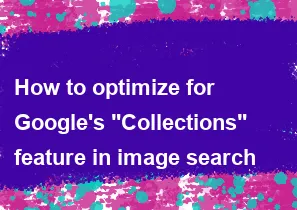How to optimize for Google's "Collections" feature in image search

Google's "Collections" feature in image search wasn't a well-defined or widely-known feature. However, I can provide some general strategies for optimizing images for search engines, including Google, which could potentially benefit if such a feature becomes more prominent in the future:
High-Quality Images: Ensure your images are of high quality, relevant to the content of your page, and visually appealing. Google tends to favor high-quality images in its search results.
Image Metadata: Use descriptive filenames for your images that include relevant keywords. Also, optimize the alt text attribute to describe the image accurately and include relevant keywords where appropriate.
Image Size and Format: Optimize your images for web performance by compressing them without sacrificing quality. Use appropriate image formats like JPEG, PNG, or WebP depending on the content of the image.
Image Sitemap: Include images in your website's XML sitemap to help search engines discover and index them more effectively.
Structured Data Markup: Implement structured data markup (e.g., Schema.org) for your images to provide additional information about them to search engines. This can include details like the image's subject matter, location, author, and more.
Page Relevance: Ensure that the images you use are relevant to the content of the page they appear on. Google aims to provide users with the most relevant and useful results, so context is crucial.
Mobile-Friendly Design: With the increasing emphasis on mobile-friendliness in search rankings, ensure that your images are optimized for mobile devices and that your website is responsive and mobile-friendly overall.
Social Sharing: Encourage social sharing of your images through platforms like Pinterest, Instagram, and others. Social signals can indirectly impact search engine rankings.
Backlinks: Obtain backlinks from reputable websites to your image pages or the pages containing your images. Backlinks remain an important ranking factor for Google.
User Experience: Finally, focus on providing a great user experience. Fast-loading pages, easy navigation, and engaging content can indirectly impact your site's visibility in search results.
Remember that while these strategies can improve the visibility of your images in search results overall, Google's algorithms are constantly evolving, and specific features like "Collections" may require additional or different optimization strategies if they become more prominent in the future. Regularly monitoring updates from Google and staying informed about changes in search engine optimization best practices is essential for maintaining visibility in search results.
-
Popular Post
- How to optimize for Google's About This Result feature for local businesses
- How to implement multi-language support in an Express.js application
- How to handle and optimize for changes in mobile search behavior
- How to handle CORS in a Node.js application
- How to use Vue.js with a UI framework (e.g., Vuetify, Element UI)
- How to configure Laravel Telescope for monitoring and profiling API requests
- How to create a command-line tool using the Commander.js library in Node.js
- How to implement code splitting in a React.js application
- How to use the AWS SDK for Node.js to interact with various AWS services
- How to use the Node.js Stream API for efficient data processing
- How to implement a cookie parser middleware in Node.js
- How to implement WebSockets for real-time communication in React
-
Latest Post
- How to implement a dynamic form with dynamic field styling based on user input in Next.js
- How to create a custom hook for handling user interactions with the browser's device motion in Next.js
- How to create a custom hook for handling user interactions with the browser's battery status in Next.js
- How to implement a dynamic form with dynamic field visibility based on user input in Next.js
- How to implement a dynamic form with real-time collaboration features in Next.js
- How to create a custom hook for handling user interactions with the browser's media devices in Next.js
- How to use the useSWRInfinite hook for paginating data with a custom loading indicator in Next.js
- How to create a custom hook for handling user interactions with the browser's network status in Next.js
- How to create a custom hook for handling user interactions with the browser's location in Next.js
- How to implement a dynamic form with multi-language support in Next.js
- How to create a custom hook for handling user interactions with the browser's ambient light sensor in Next.js
- How to use the useHover hook for creating interactive image zoom effects in Next.js